

A Teacher's Letter To His Students Before They Take A Standardized Test Is Making People Cry, And That's A Good Thing. The 4 Properties of Powerful Teachers - Advice. By Rob Jenkins American higher education seems to be experiencing a kind of teaching renaissance.
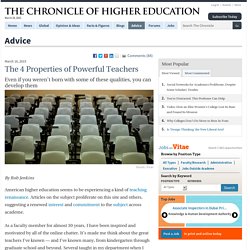
Articles on the subject proliferate on this site and others, suggesting a renewed interest and commitment to the subject across academe. As a faculty member for almost 30 years, I have been inspired and motivated by all of the online chatter. It’s made me think about the great teachers I’ve known — and I’ve known many, from kindergarten through graduate school and beyond.
Several taught in my department when I served as chair, and I had the pleasure of observing them at work. Those experiences have led me to conclude that, when we boil down all the metrics, we’re left with four qualities that all powerful teachers possess. So what makes those teachers so great? Personality. Just what are those traits? If none of the above describe you, and you’re afraid that means you’ll never be a great teacher — well, maybe you’re right. Presence. Preparation. b3ff3f368b7582ecabeefb52becfda28.jpg (400×400) Teacher Gift . 5x7 Subway Art Poster Print Sign // by ILoveItAll. 9a8e90de41d26b4f8d3592d0cf5ce4e2.jpg (921×1411) Does it pay to know your type? Elements & Toolkits. Elements of Effective Practice for Mentoring™, Third Edition MENTOR’s keystone publication on mentoring standards has been recently updated and released to include the latest research and practice wisdom available to help mentoring relationships thrive and endure.
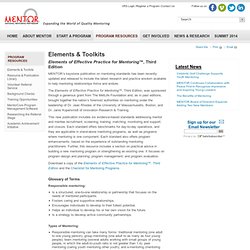
The Elements of Effective Practice for Mentoring™, Third Edition, was sponsored through a generous grant from The MetLife Foundation and, as in past editions, brought together the nation’s foremost authorities on mentoring under the leadership of Dr. Jean Rhodes of the University of Massachusetts, Boston, and Dr. Janis Kupersmidt of innovation Research & Training. Become A Mentor. Few bonds in life are more influential than those between a young person and an adult.
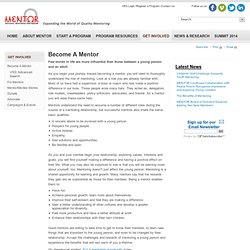
As you begin your journey toward becoming a mentor, you will need to thoroughly understand the role of mentoring. Look at a role you are already familiar with. Most of us have had a supervisor, a boss or coach who has made a positive difference in our lives. Those people wore many hats. They acted as, delegators, role models, cheerleaders, policy enforcers, advocates, and friends. How to be an Effective Mentor in Times of Change. I’d only been in publishing a few years when the great Ian Ballantine engaged me in conversation and suggested, in his signature circuitous fashion, that he was willing to mentor me.
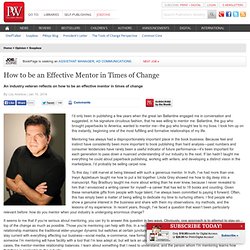
Ballantine, the guy who brought paperbacks to America, wanted to mentor me—the guy who brought tea to my boss. I took him up on this instantly, beginning one of the most fulfilling and formative relationships of my life. Mentoring. Supporting Beginning Teachers:The Don'ts and Don'ts of Teaching. One piece of advice that I've seen in numerous books about teaching is to always phrase classroom rules positively.
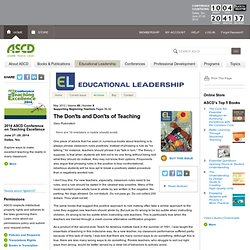
Instead of phrasing a rule as "no talking," for instance, teachers should phrase it as "talk in turn. " The theory, I suppose, is that when students are told not to do one thing without being told what they should do instead, they may not know their options. Proponents also argue that phrasing rules in the positive is less confrontational; rebellious students will be less apt to break a positively stated procedure than a negatively worded rule.
I don't buy this. For new teachers, especially, classroom rules need to be rules, and a rule should be stated in the clearest way possible. The same books that suggest this positive approach to rule making often take a similar approach to the rules they suggest new teachers should abide by. Supporting Beginning Teachers:The Don'ts and Don'ts of Teaching. Mentoring. The Effect of Affect - Coach G's Teaching Tips - Education Week Teacher. Webinars. Developingmentoringskills2013 [licensed for non-commercial use only] / Week 2. Week 2: (Jan 21st- 27th) Trustworthy/Trusting -- defining and understanding the basics of interaction Webinar: Join us for a webinar on Mentor/mentee relationship, share your ideas and have a discussion with the other participants.
![developingmentoringskills2013 [licensed for non-commercial use only] / Week 2](http://cdn.pearltrees.com/s/pic/th/licensed-commercial-only-week-49983029)
Our Guest Speaker: Gabriel Díaz Maggioli Time: Wednesday January 23rd, hour TBC ( 9- 10 AM New York time)To check your local time click here. Venue: Collaborate (Recording.) Developingmentoringskills2013 [licensed for non-commercial use only] / Week 1. Developingmentoringskills2013 [licensed for non-commercial use only] / Week 3. Week 3: (Jan 28th- Feb 3rd) - Tools for Reflective Conversations Week 3 - Readings: Essential reading (we would like every participant to read this in order to be able tot contribute to the weekly discussion): Tools for reflective conversation (pdf) (click on the Download tab in the upper left hand corner to access the file) Recommended reading (we recommend this if you would like to know more about the topic of the week, and have time for a bit more in-depth reading): Helping Teachers Communicate (pdf) (click on the Download tab in the upper left hand corner to access the file) Extra reading (this is some great extra material you might find useful): Toward Reflective Conversations (link)
![developingmentoringskills2013 [licensed for non-commercial use only] / Week 3](http://cdn.pearltrees.com/s/pic/th/licensed-commercial-only-week-49982311)